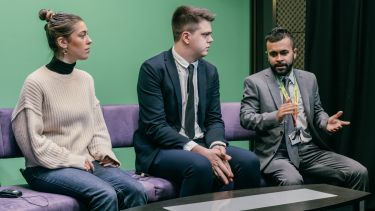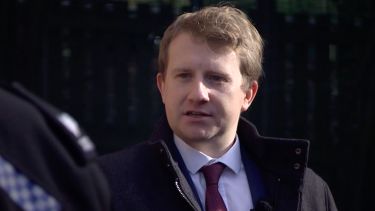I put everything I learned at 91Ö±²„ into practice pretty much every day in my job.

My role is a really varied one - Production Journalists work a number of different shifts at ITV, including producing our Good Morning Britain, lunchtime, late and weekend bulletins. I also do Assistant Producer shifts on the main 6pm programme which involves doing Zoom interviews and cutting pictures. We also have an online shift where you spend the day writing web articles and updating social media. And occasionally I'll be on a planning shift which is helping set up the programme for the next day. One of the things I love about the job is the range of shifts as no two weeks are the same and you really get to hone your skills in all areas of TV news production. It's also brilliant to get the chance to do a bit of reporting when we pitch our own stories as the bosses are really keen to help us develop by giving us the space and time to work on our own ideas. The challenges when producing bulletins are hitting deadlines and being ready to throw out your original plan when a big story breaks. Plus having to get up a silly o'clock when on GMB!
I spent six years working in commercial radio before I made the leap into TV. I started off freelancing at Global Radio up in the North East and then applied for a job with Bauer which I didn't get but after the interview they offered me another one, as a reporter at CFM up in Carlisle. I'd never even been to the city before but took the plunge and moved there despite knowing literally no-one. The gamble paid off because six months later I was given the job of reporter at one of Bauer's biggest stations, Hallam FM back in 91Ö±²„. And then a few years later I was promoted to Chief Reporter in Yorkshire.
I gained so much time from my time in commercial radio - the experience of going to report on huge stories and developing contacts in a patch as varied and lively as South Yorkshire put me in a good position when I was ready to move on.
Ben Bason
MA Broadcast
I definitely owe a lot to my time on the course. One of the most vital things is knowledge of media law - I really enjoyed the legendary Mark Hanna's lectures! And I put everything I learned in them into practice pretty much every day in my job. So many news stories could pose some sort of legal risk if you go about them in the wrong way, so having a solid understanding of media law is so important. But I also learned a lot of the nuts and bolts of journalism from tutors like Lynn Dixon who really inspired me to push myself to produce ear-catching radio.
I will always remember David Holmes, who has since retired from teaching, entering our first lecture wearing a saucepan on his head! I don't quite remember why...I think he was making some sort of point about journalism. But it certainly gave me a good first impression of the course!

Our outstanding reputation for journalism
We're ranked as one of the top 5 universities to study journalism in the Guardian and the Complete University Guide - we're also 1st in the Russell Group for learning resources, student voice and learning opportunities according to the National Student Survey.

Postgraduate online open day
Become part of our community of talented postgraduate taught students. Register now to join us at our online open day on Wednesday 30 April 2025.

